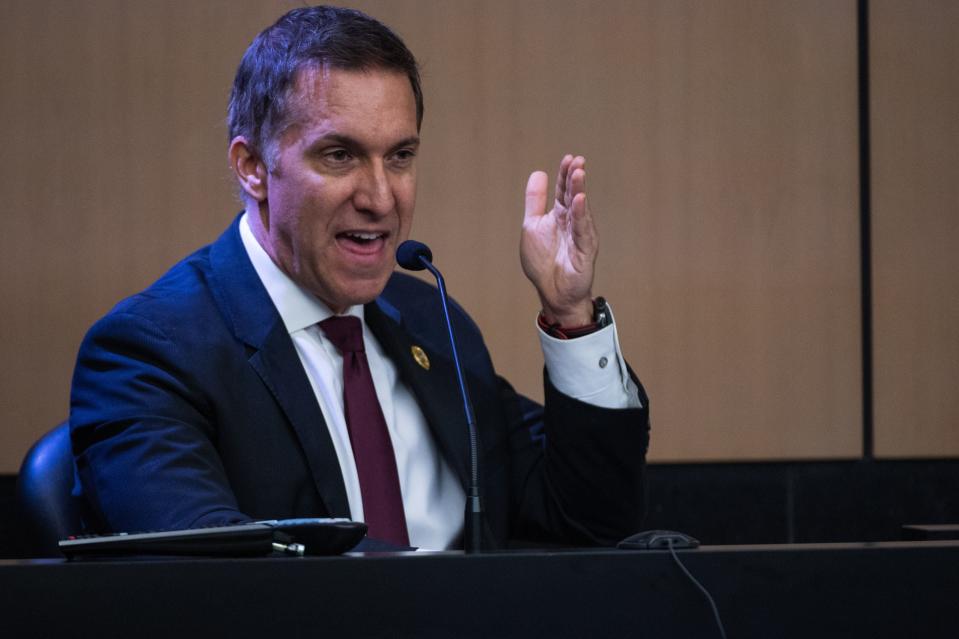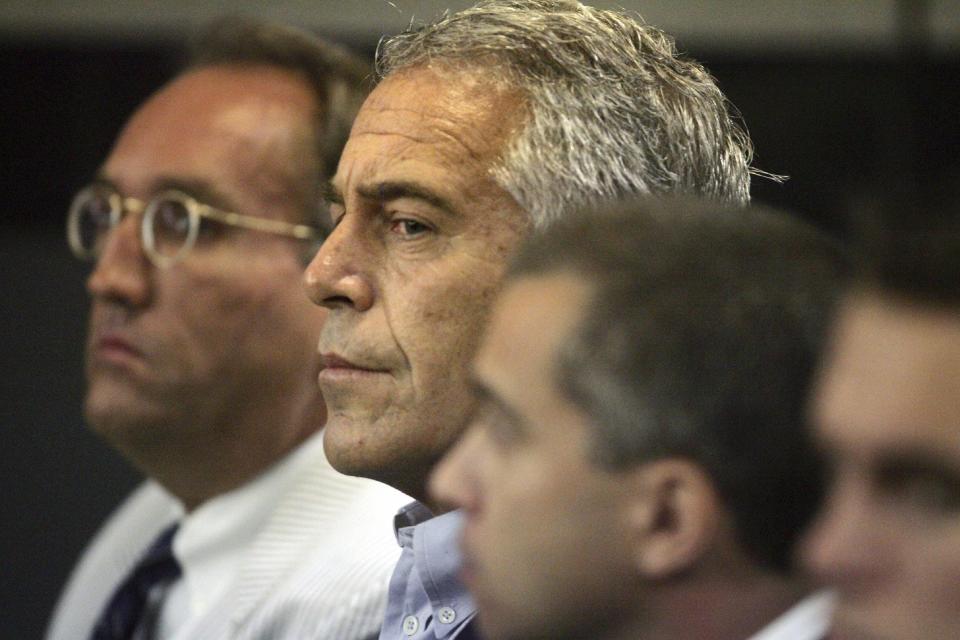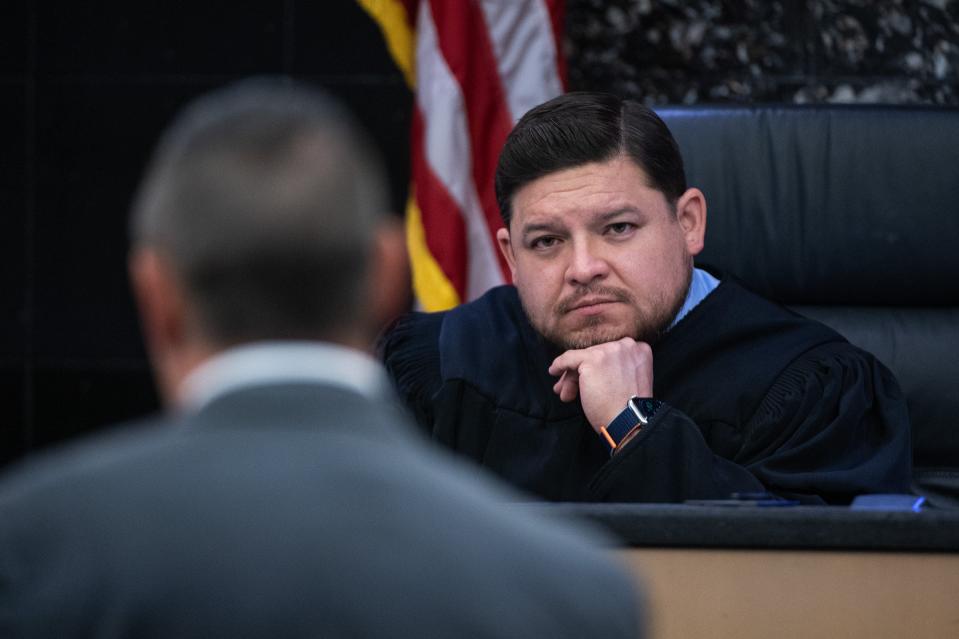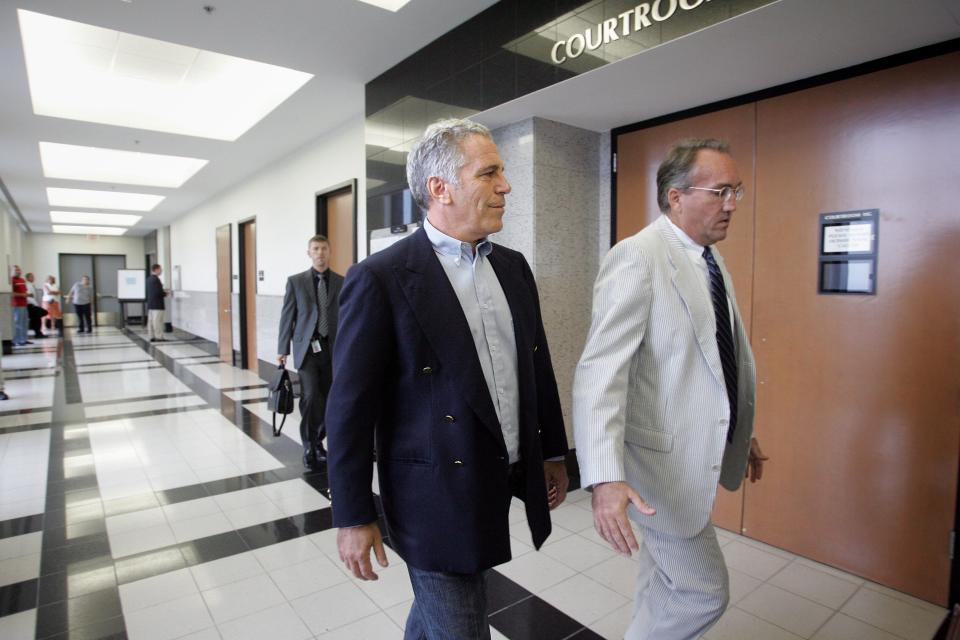Dave Aronberg: Post's suit to unseal Jeffrey Epstein documents meant only to humiliate me
- Oops!Something went wrong.Please try again later.
A legal battle for grand jury transcripts that could show why serial child molester Jeffrey Epstein wasn’t harshly punished in 2006 erupted in name-calling this week when Palm Beach County State Attorney Dave Aronberg accused The Palm Beach Post of filing the lawsuit to punish him.
Even though the grand jury was convened by a previous state attorney, six years before Aronberg was elected, the former state lawmaker insisted the lawsuit to unseal the secret records was filed to embarrass him.
In a fiery diatribe, an angry Aronberg told Circuit Judge Luis Delgado that the newspaper’s lawsuit was part of a twisted decade-long campaign to make him look bad. He blasted the suit as frivolous and said The Post should be forced to pay his attorneys roughly $71,000 for dragging him into the legal fight.
“They did it on the back of someone they have extreme dislike for,” he testified during the hearing that wrapped up Thursday. Post Executive Editor Rick Christie called Aronberg's claims "ludicrous."
The Post's 2019 investigation: Jeffrey Epstein case, the first failure: To the first prosecutors, Epstein's victims were prostitutes
Appeal: Palm Beach Post asks appeals court to release grand jury transcripts in Jeffrey Epstein sex case
Why The Post sued: Why was Jeffrey Epstein charged only as a ‘john’? Post sues to find out
Aronberg initially testified that he was trying to save taxpayers money by seeking sanctions against the paper and its attorneys for suing him to get the records. But, he later acknowledged, taxpayers aren't on the hook. His lawyers won’t get paid unless Delgado orders the paper to write them a check.
Palm Beach Post attorneys insist the lawsuit wasn't an attack
Attorneys for The Post insisted that the lawsuit wasn’t an attack on Aronberg.
“I voted for Mr. Aronberg. I have no animus against him,” testified attorney Stephen Mendelsohn, who was part of the paper's legal team. “This was a sober decision to sue someone in their official capacity. We took pains to make sure we weren’t accusing him of any wrongdoing at any time.”
The paper and its attorneys simply wanted to find out why Epstein wasn't vigorously prosecuted and share the information with the public, he said. Aronberg was sued because they believed his office had the records that would shed light on the extraordinary case that attracted international attention. Grand jury material can only be released by court order.
After The Post in 2019 published an investigation into why Epstein received what one prosecutor called “the deal of the century,” questions remained about why the politically connected millionaire wasn’t charged with child molestation. Palm Beach police found evidence he had abused more than a dozen teens at his waterfront mansion.

Then-State Attorney Barry Krischer took the unusual step of presenting the case to a grand jury. It indicted Epstein on a single charge of solicitation of prostitution.
Sources told The Post that Krischer's top prosecutors vilified the lone Epstein accuser who was called to testify. Using documents provided by Epstein’s high-powered defense team, they focused on the 14-year-old girl's social media posts instead of the abuse she endured, said sources familiar with the closed-door proceedings.
Ultimately, as part of a controversial non-prosecution agreement with federal prosecutors, Epstein was allowed to plead guilty to two felony charges of solicitation, including one involving a minor. He served 13 months of an 18-month sentence and was allowed to leave the Palm Beach County Stockade on work release for up to 12 hours a day, six days a week.
Dave Aronberg reverses course: State attorney drops objection to releasing secret Epstein documents
Who is state attorney Dave Aronberg?: A study in contradiction.
Public records law: Is State Attorney Dave Aronberg's office violating the open records law?
After assembling hundreds of documents and interviewing retired Palm Beach Police Chief Michael Reiter and others, Mendelsohn said he and fellow attorneys were convinced that the only way to find out why the police investigation was derailed was to file a lawsuit to get the grand jury transcripts.

Did former Palm Beach County State Attorney Barry Krischer abuse his authority?
The newspaper and attorneys at the Greenberg Traurig law firm wanted to know whether "the former state attorney abused his authority by using material from a defense attorney to undermine a witness he called to testify before the grand jury," Mendelsohn testified.
The case was complex, he said.
Florida law rigorously protects the secrecy of grand jury proceedings, and few lawsuits have been filed to pierce that veil. Mendelsohn said he researched dozens of cases, trying to figure out the best legal strategy.
“I wanted to see who to sue to be perfectly honest,” he told Delgado.
Ultimately, he said, a decision was made to sue both Aronberg and the clerk of courts, now Joseph Abruzzo, who is responsible for maintaining all court records.
When the suit was filed in November 2019, Mendelsohn said he didn’t know whether Aronberg had the grand jury transcripts or not. Aronberg’s office didn’t respond to public records requests, he said.
But, Aronberg testified, in January 2020 he sent out a press release making it clear he didn’t have the materials the paper wanted.
Aronberg testifies that the state attorney's office never had grand jury records
“The Jeffrey Epstein case occurred several years and multiple State Attorney administrations before I became Palm Beach County State Attorney in 2013,” he said in the press release. “As such, I have never seen or had access to the Epstein Grand Jury transcripts, as the State Attorney’s office has never possessed them.”

Aronberg blasted The Post for never publishing the release that announced he had created a web portal so the public could view all of the records his office had that were related to the Epstein investigation. The oversight, he said, was yet more evidence of the paper’s bias.
The paper's refusal to acknowledge his transparency was particularly galling because a month earlier it had published a story when he filed court papers that vigorously opposed The Post's request to get the grand jury records. In that filing, he said he didn’t have the documents, which the paper reported.
The article had political repercussions. Believing he was preventing the public from finding out about Epstein’s so-called "sweetheart deal," at least one person wrote him, demanding his resignation, Aronberg said. A former state attorney, Peter Antonacci, also weighed in. “He asked me why I was covering for Barry Krischer,” Aronberg testified.
Even with Aronberg’s insistence that he didn’t have the records, Mendelsohn said he was still a critical party to the suit. As state attorney, he is tasked with protecting the grand jury process. He also has broad authority to protect its secrecy. That meant Aronberg could ask that the records remain sealed.
Even if The Post won the suit against Abruzzo, the state attorney could go to court to prevent the clerk from releasing the records, Mendelsohn said.
State attorney later says he has no objection to transcript's release
It wasn’t until October 2020 when Aronberg in court papers said he had “no objection, and never has had any objection” to the release of the grand jury transcripts that, Mendelsohn said, it was safe to drop him from the lawsuit.
“It was a massive change in position,” Mendelsohn testified. “It was a sea change as far as we were concerned in the status of the case. … I was pleased.”
But Aronberg and his attorney Douglas Wyler said The Post waited too long. In June 2020, Wyler sent Mendelsohn a letter, putting the law firm and the paper on notice that he would seek attorneys' fees if they didn’t dismiss Aronberg from the lawsuit.
In July, Wyler followed up by filing the request in court. By law, he said the paper had 21 days to drop Aronberg from the lawsuit. It didn’t do so until Oct. 21, 2020.
“They cannot sue you for what you don’t have,” said Wyler, who practices in Amelia Island. While his firm represents the Florida Prosecuting Attorneys Association, it was hired by Aronberg under a separate contingency fee agreement that allows it to be paid only if a court orders it.
But Post attorneys said the legal papers Wyler filed in July 2020 were flawed. He didn’t file a detailed motion until November. By then, the paper had dismissed Aronberg from the suit.
But, most importantly, they said, attorneys fees can be awarded only when someone is forced to defend themselves against a frivolous lawsuit that was filed in bad faith.
The lawsuit The Post filed was unusual, Mendelsohn said. It sought to expand a rarely used section of Florida law that allows grand jury records to be released to further the interest of justice.
While Circuit Judge Donald Hafele in December 2021 rejected the paper’s request, he didn’t find that the lawsuit was filed recklessly, said attorney Lauren Whetstone, who also represents the paper. The Post has appealed his decision.
Judge cites 'strong arguments' but still rejects newspaper's request
In a 10-page order in December, Hafele said the newspaper made “strong arguments.” But, he said, Florida law allows grand jury records to be released only in pending criminal or civil cases. Epstein’s case in Palm Beach County was long over when he was found hanged in a New York City jail cell in August 2019 while awaiting trial on multiple charges of child sex trafficking.
Hafele described the paper’s arguments as "sincere" and "palatable and persuasive." Further, he said, the lawsuit raised important constitutional issues about the public’s right to know.
“That doesn't square with Aronberg's claims that the newspaper acted in bad faith,” Whetstone said.
Aronberg disagreed. While testifying, he repeatedly used the words “bad faith” and “frivolous” to describe the suit.

He insisted it was one more volley in a long grudge match. The bad blood began when newspaper staffers believed he used his influence to push out a Post executive, he said. That top editor’s “acolytes” then began a campaign to discredit him, Aronberg said. The editor accepted a buy-out package and left the paper at the end of 2013.
Further, Aronberg claimed, the newspaper hired a reporter to cover his office who had been “prosecuted by my office for crack cocaine.”
The award-winning journalist, who worked as an investigative reporter before leaving the paper last year for another job, was placed in a pre-trial diversion program after his 2006 arrest. After successfully completing an intensive court-monitored rehabilitation program, Krischer's prosecutors dismissed the charge. He has been sober for 16 years.
The Post isn’t identifying the former employees because they aren’t involved in the lawsuit. Neither wanted to comment.
Aronberg also blasted the newspaper for filing a lawsuit to reverse a court order that keeps his ex-wife’s deposition in a criminal case from public view. Attorneys for Wellington developer Glenn Straub claim the deposition is critical to his defense. In court filings, they have strongly criticized Aronberg for petitioning to keep the deposition under seal.
But, Aronberg insisted, The Post's continuing assault on him is all part of a pattern.
“The Palm Beach Post has spent 12 years attacking me,” Aronberg testified. “They published many hundreds of articles. … It continues to this day.”
The executive editor of the Post said the paper doesn't have a vendetta against Aronberg.
"The Post, of course, disputes this week's ludicrous statements by the state attorney," Christie said. "The Jeffrey Epstein case was, and remains, one of the most heinous in our county's history. The Post continues to pursue the facts of that tragic story about the victimization of teenage girls without malice in order to bring those facts into the light."
While Post attorneys insisted the paper should not be forced to pay Wyler's firm's fees, it said some are clearly not allowed.
For instance, it objected to Wyler's request to be paid $425 an hour, or a total of $10,400, for driving from north Florida to West Palm Beach for two hearings. It also said he shouldn't be paid nearly $570 to prepare media statements for Aronberg or roughly $1,500 in expenses, including a $660-a-night stay at a hotel.
Delgado, who recently took over Hafele’s cases in civil court, made few comments during the hearing that lasted roughly five hours over two days. On Thursday, he gave the attorneys three weeks to file one last round of legal arguments. He gave no indication when he might rule.
Jane Musgrave covers federal and civil courts and occasionally ventures into criminal trials in state court. Contact her at jmusgrave@pbpost.com.
This article originally appeared on Palm Beach Post: Jeffrey Epstein case: State attorney says Palm Beach Post out to get him

